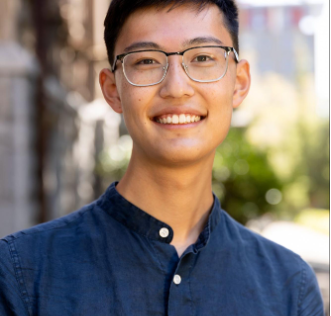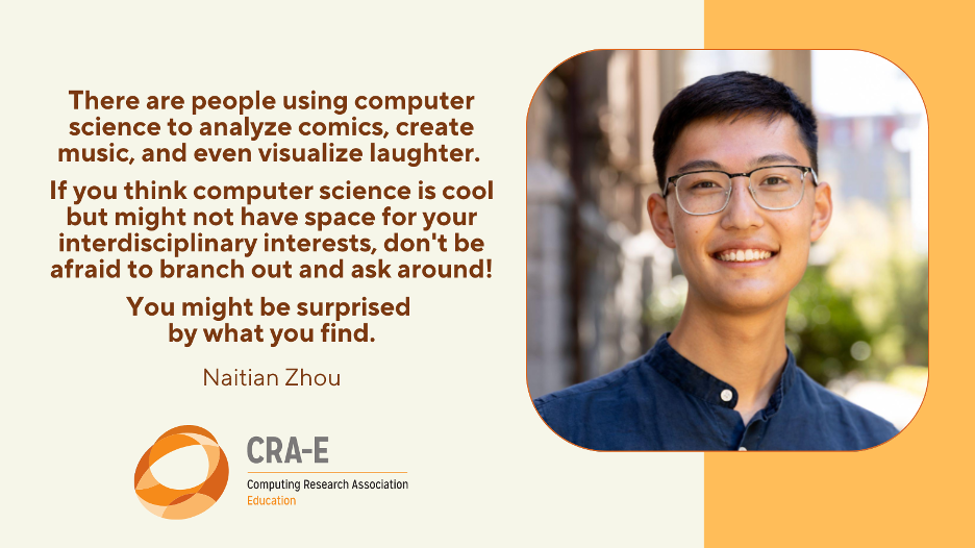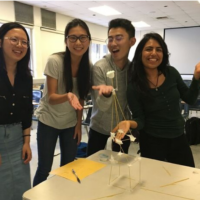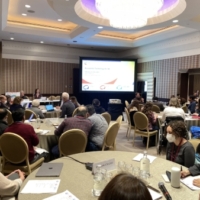CRA-E’s Undergraduate Research Highlights: Empathy in Condolences – Computational methods for delivering thoughtful condolences
CRA-E’s “Undergraduate Research Highlights” series showcases outstanding research done by undergraduate students at universities and colleges across North America. Each article features the story of a successful undergraduate researcher and offers personal insights into their experiences with finding an advisor, undertaking new research projects, and discovering how research can impact their personal and professional future. It is one of a number of CRA-E’s activities that foster and recognize talented computing researchers with the goal of increasing the research pipeline, promoting graduate education, and advocating research-based careers.
In addition to helping students understand the process of getting involved in research, the articles also serve as a venue for students to pass along advice to others who aspire to become involved in research themselves. Students selected for the research highlights include those receiving recognition in the CRA Outstanding Undergraduate Researcher Award competition. This series is written and edited by CRA-E Graduate Fellows.
 Empathy in Condolences: Computational methods for delivering thoughtful condolences
Empathy in Condolences: Computational methods for delivering thoughtful condolences
Naitian Zhou, B.S. in Data Science, University of Michigan
This Q&A highlight features Naitian Zhou, an Honorable Mention in the 2022 CRA Outstanding Undergraduate Researchers award program. Naitian graduated from the University of Michigan and is now an Information Science PhD student at the University of California, Berkeley. This interview has been edited for length and clarity.
What led you to seek out your first research experience?
I joined a reading group in college, and we read a paper that used natural language processing (NLP) to predict whether a conversation would devolve into insults. It was the first time I enjoyed reading a research paper and realized people do computing research I am interested in.
How did you find your research opportunity and hone in on a project?
I initially cold-emailed a dozen professors in the CS department about doing research with them. None of those led to anything. A couple of months later, a friend asked me if I had heard of Prof. David Jurgens in the University of Michigan School of Information. Prof. Jurgens’ computational social science work seemed really interesting. I sent him an email asking if I could work in his lab, and he invited me to a lab meeting. I pitched him a few project ideas, and he liked one, so we started working on it.
Can you tell us about your project?
The initial spark for the project came in early 2019, around the time that people were making fun of politicians for saying “thoughts and prayers” because it is such an empty condolence. I was curious what made condolences sound sincere and demonstrate that one cares or empathizes with people in distress. I wasn’t sure how to tackle this problem, but I pitched it to Prof. Jurgens, and he was interested. This idea developed into the more interesting question: is the phrase “thoughts and prayers” measurably bad, and if so, what are measurably good condolences?
The main challenge was identifying when users were seeking or providing condolences. We first looked for prototypical phrases like “sorry for your loss,” then progressively collected more comments by searching similar threads, eventually collecting a big dataset of condolences from Reddit. We used this data to train machine learning models, and used those models to label even more comments. We also looked for which condolences had received an appreciative reply.
Whenever the person seeking support acknowledged the helpfulness of a comment, e.g., “your comment made my day,” we considered the comment as an example of a good condolence. Trite statements like “thoughts and prayers” were rarely considered to be good condolences, but using second person pronouns to center the distressed individual and mirroring their language can be effective strategies for better condolences. I presented our paper at EMNLP 2020.
What challenges did you encounter when first getting started in research?
The main challenge was finding an opportunity that excited me. I knew I wanted to work on projects centered around people and how they behaved or used language, but I didn’t have any idea that the field of computational social science existed, for instance. It was serendipitous that I learned about the Blablablab (Prof. Jurgens’ lab) and that the work there so closely matched my interests. It is challenging to have that awareness or perspective of the research landscape when you’re just starting out. Talking to older students helped provide that perspective.
What were some of your favorite aspects of research?
My favorite aspect of research is knowing I am getting closer to finding an answer to a question I care about. I have the opportunity to write a paper that I’d like to read. This also means that I really enjoy doing literature review, because it’s so fun to read about how others have approached and thought about the same ideas that I’m thinking about.
Have any of your personal identities affected your research experience?
I immigrated to the US with my parents when I was young. Growing up, I experienced how linguistic proficiency and cultural knowledge were essential to fitting in, making friends, and succeeding in school. My research focuses a lot on trying to understand cultural knowledge and belonging. Computing research has empowered me to explore these topics that are so personally relevant in really interesting, novel ways.
Do you have any advice for other students looking to get into research?
So many people work on so many different things in the world! When I started college, computing research felt too esoteric to be relevant to my life. But I discovered there is a space where people are working on questions that I’m interested in! There are people using computer science to analyze comics, create music, and even visualize laughter. If you think computer science is cool but might not have space for your interdisciplinary interests, don’t be afraid to branch out and ask around! You might be surprised by what you find.
— Edited by Nadia Ady and Yasra Chandio










